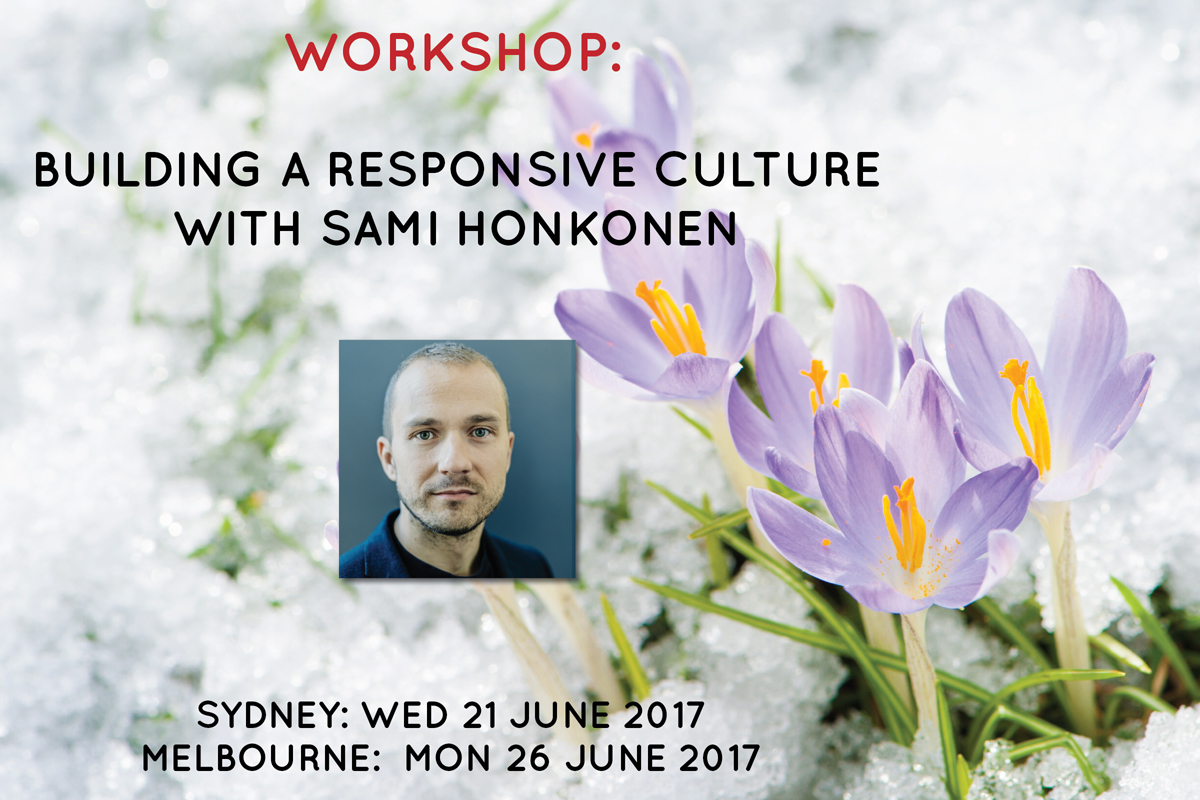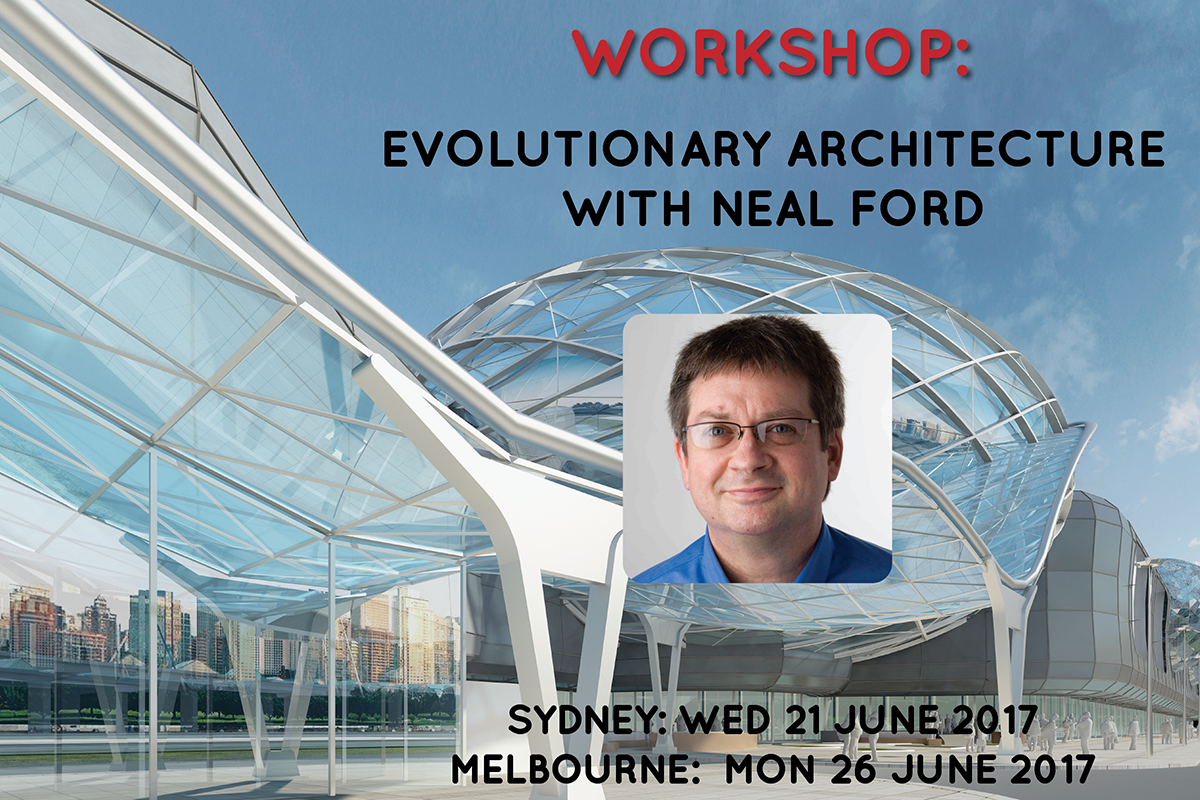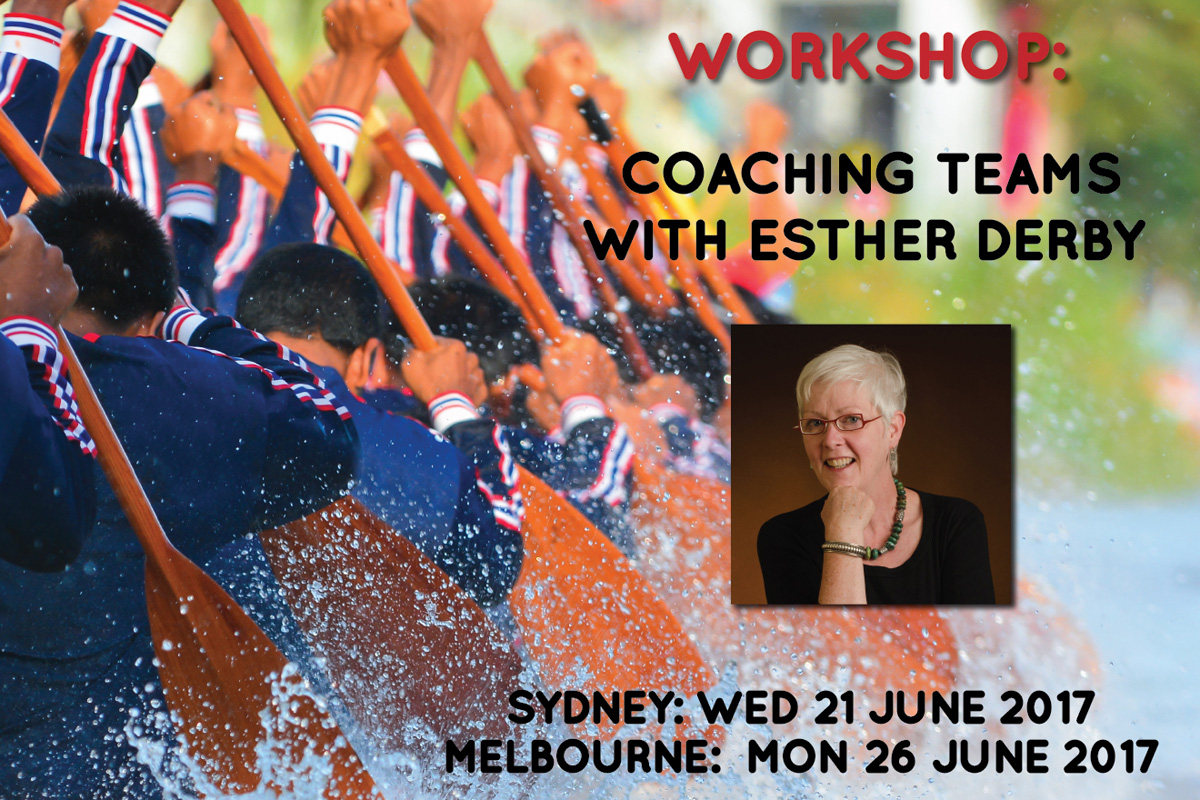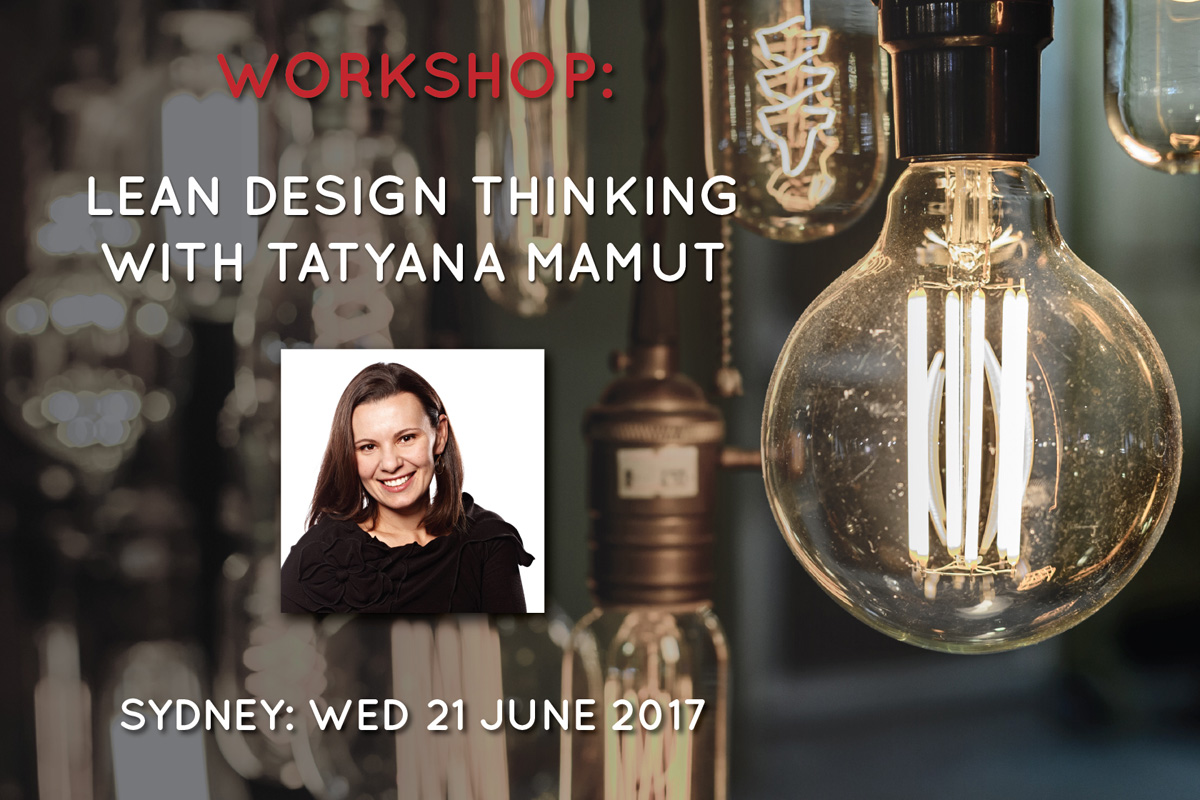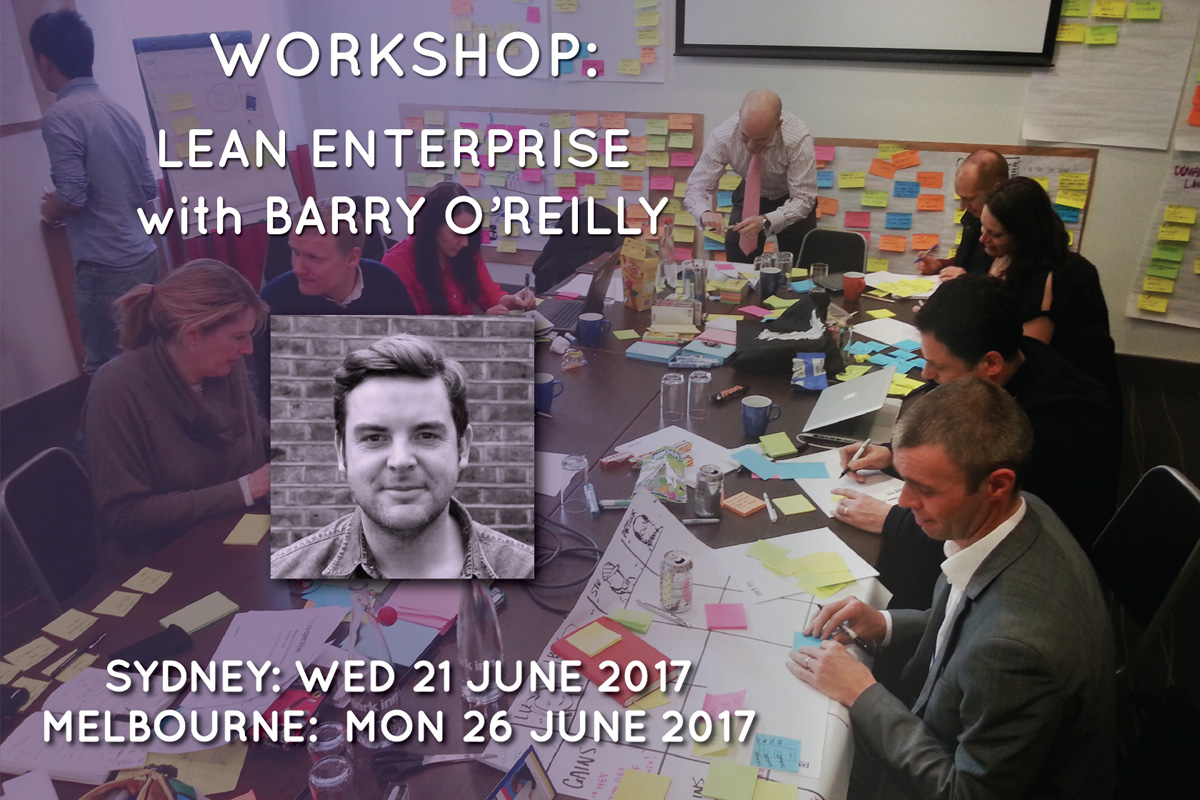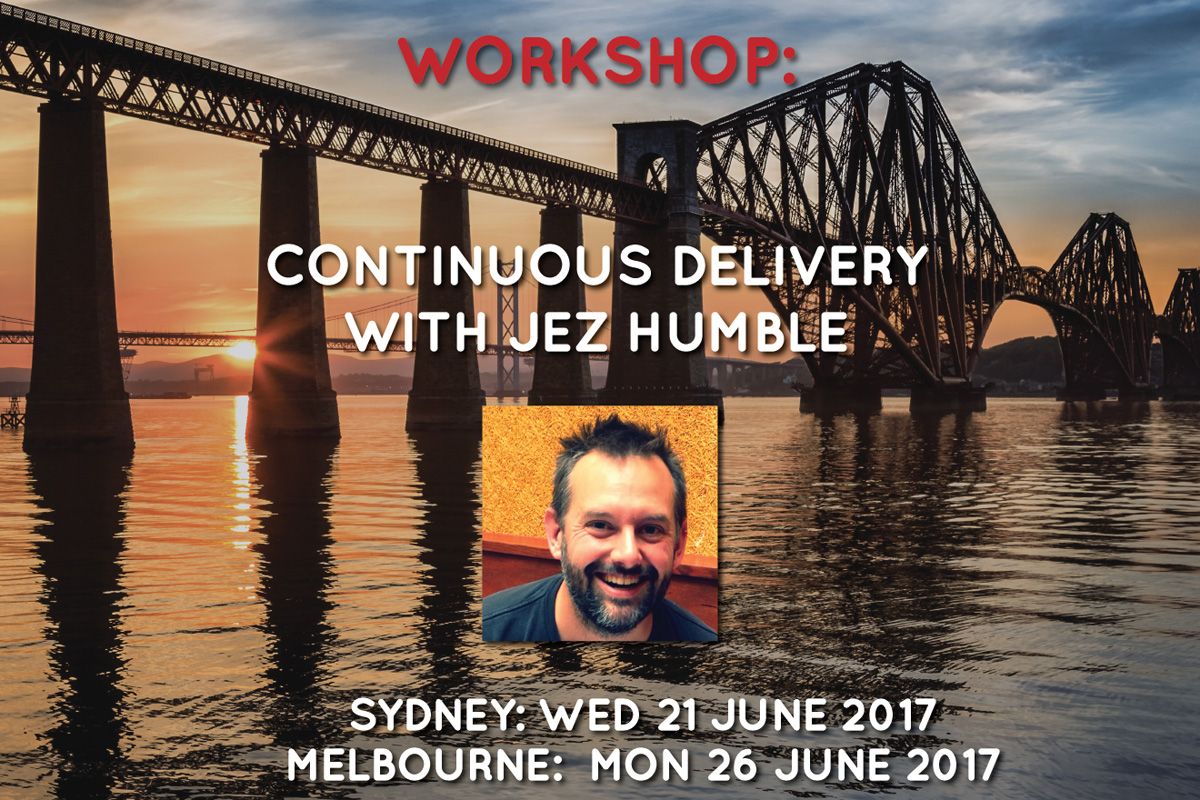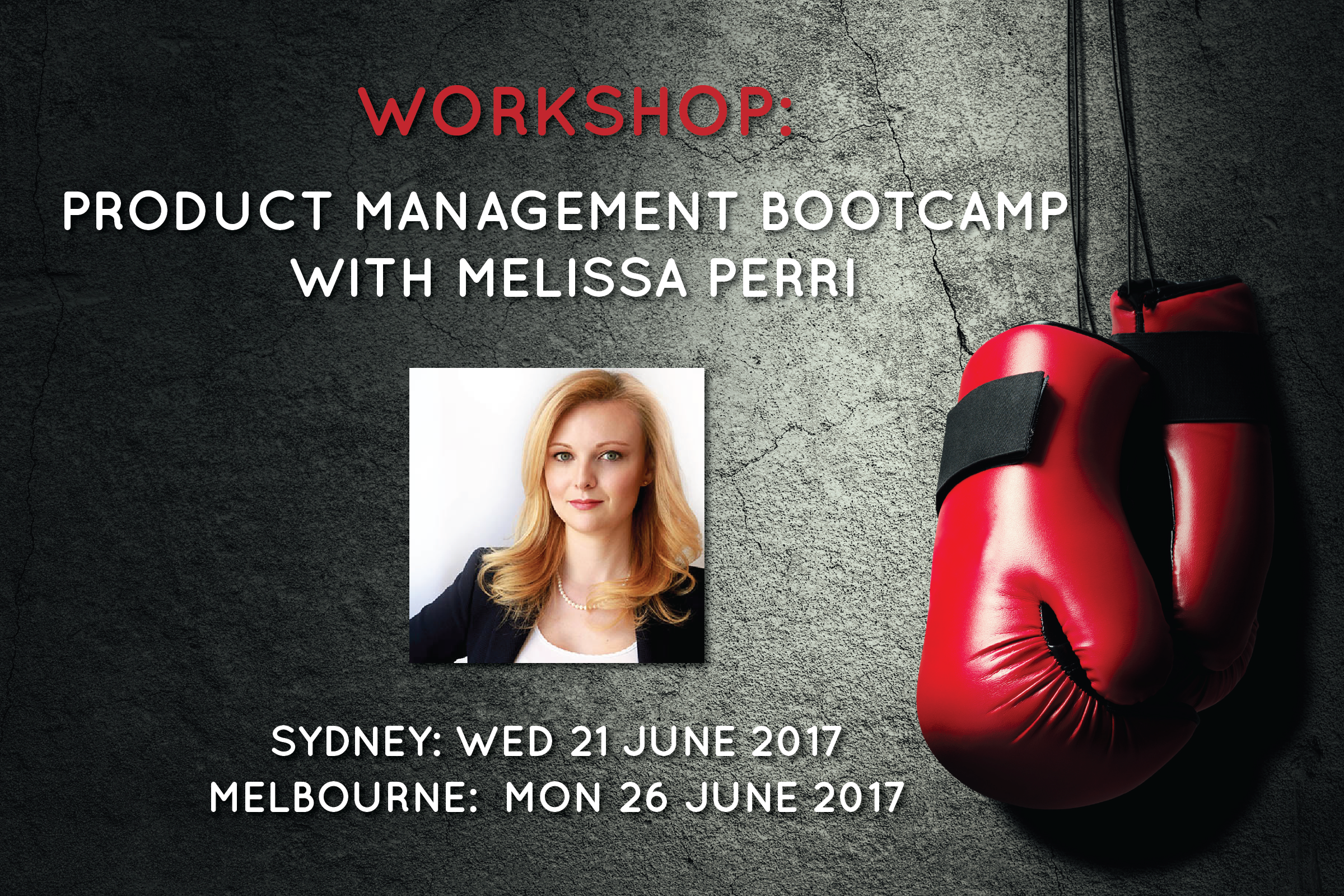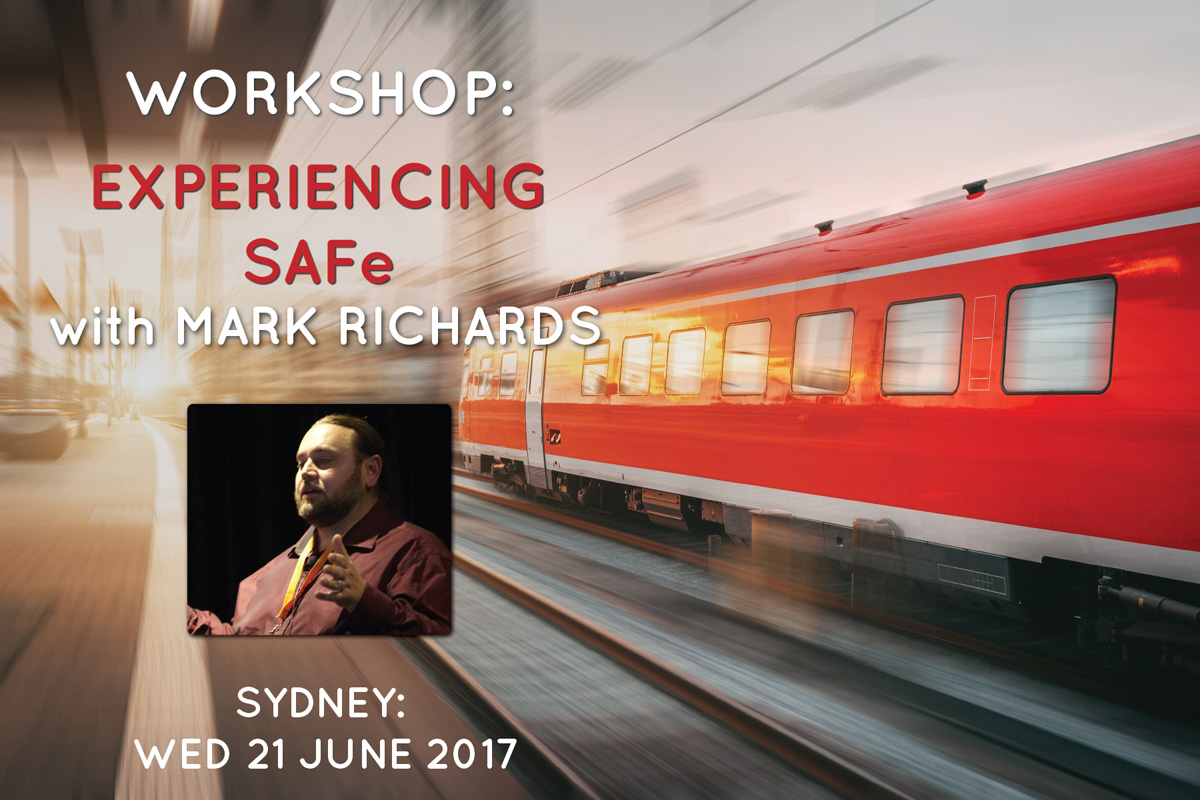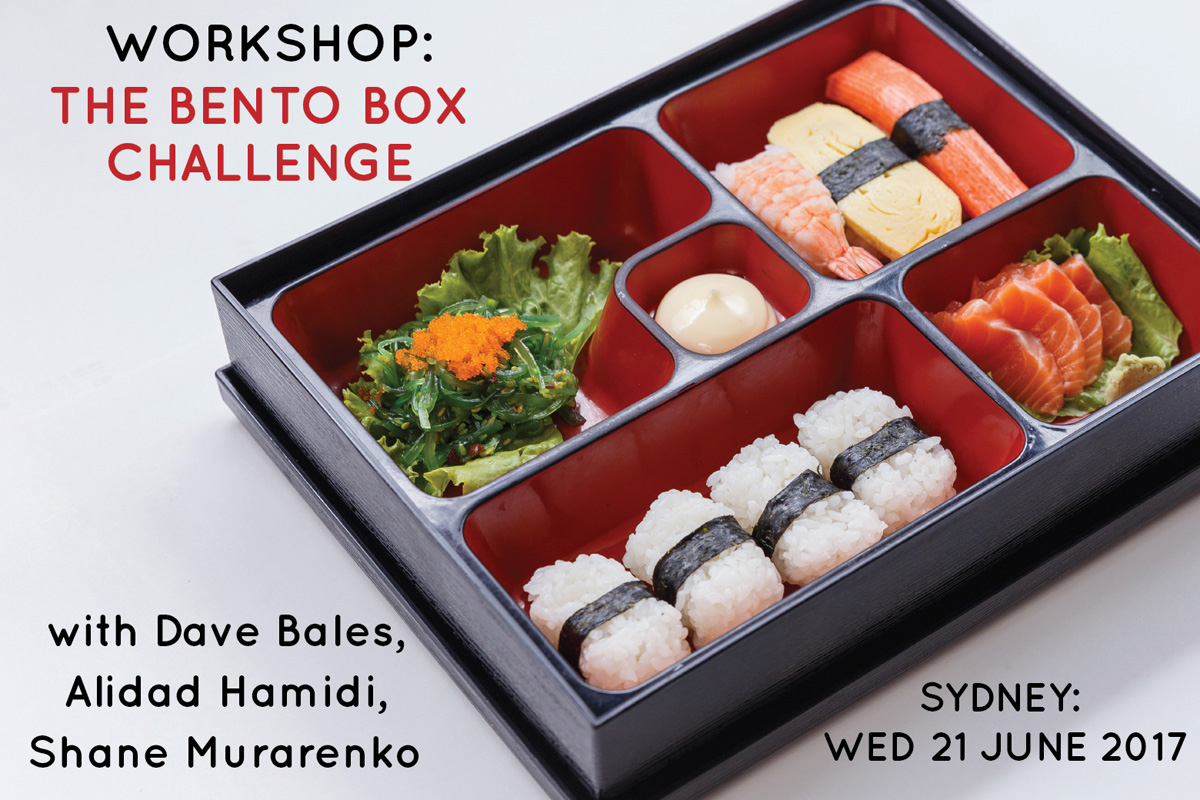Workshops
Expand your Agile knowledge with Sydney and Melbourne workshops led by renowned international experts. Dive into workshops on culture, continuous delivery and DevOps, Lean Enterprise, Minimum Viable Products, and more!
9:00am-5:00pm | SYD WED 21.JUN.17 / MEL MON 26.JUN.17
Building a responsive culture
with Sami Honkonen – CEO, Tomorrow Labs
Learn how to understand and develop your company culture, and discover tools for planning good culture experiments.
In an ecosystem which is subject to unpredictable change, creating and generating a boss-level company culture is essential for success. But how exactly can an organisation initiate culture change?
You will move from the foundations of company culture through to discovering the tools for creating your own culture experiments.
Workshop participants will learn:
- To understand company culture with Culture Mapping
- The foundations of company culture, from history and system conditions to leader behaviour
- How to develop culture through experiments
- How to plan a good culture experiment
- The tools for better experiments – including SCARF; GROW; Responsibility process; Choose your focus model
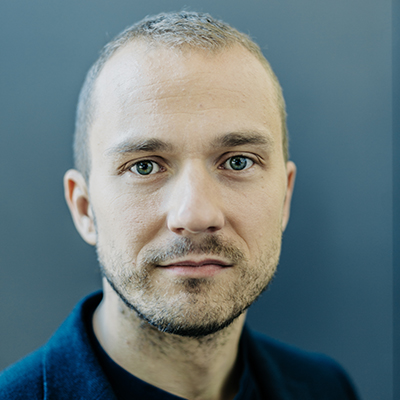
Sami Honkonen is the CEO of Tomorrow Labs, a digital product house. He’s also the host of Boss Level Podcast and blogger at blog.samihonkonen.com, both of which cover topics such as systems thinking, complexity, leadership and tech. In his spare time Sami is the vocalist for death metal band Embreach.
9:00am-5:00pm | SYD WED 21.JUN.17 / MEL MON 26.JUN.17
Evolutionary Architecture
with Neal Ford – Software Architect, ThoughtWorks
An evolutionary architecture supports incremental, guided change as a first principle across multiple dimensions.
For many years, software architecture was described as the “parts that are hard to change later”. Then microservices showed that if architects build evolvability into the architecture, change becomes easier. This workshop, based on Neal Ford’s upcoming book, investigates the family of software architectures that support evolutionary change, along with how to build evolvable systems. Understanding how to evolve architecture requires understanding how different parts of architecture interact. Learn how to achieve appropriate coupling between components and services. Incremental change is critical for the mechanics of evolution – discover how to build engineering and DevOps practices to support continuous change. Uncontrolled evolution leads to undesirable side effects; understand how fitness functions build protective, testable scaffolding around critical parts to guide the architecture as it evolves.
The software development ecosystem exists in a state of dynamic equilibrium, where any new tool, framework, or technique leads to disruption and the establishment of a new equilibrium. Predictability is impossible when the foundation architects plan against changes constantly in unexpected ways. Instead, prefer evolvability over predictability. This hands-on workshop provides a high-level overview of a different way to think about software architecture.
This workshop covers:
- Architecture dimensions
- Engineering incremental change
- Architectural characteristics
- Identifying components
- Identifying architectural patterns
- Identifying fitness functions
- Retrofitting existing architectures
- Building evolvable architectures
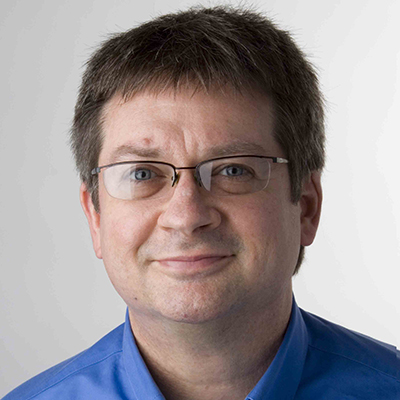
Neal Ford is a Director, Software Architect, and Meme Wrangler at ThoughtWorks. He is also the designer and developer of applications, articles, video presentations, and author and/or editor of an increasingly large number of books spanning a variety of subjects and technologies, including his most recent Presentation Patterns and Functional Thinking. Neal’s professional focus includes designing and building large-scale enterprise applications. Neal is also an internationally known speaker, speaking at over 700 developer conferences worldwide, delivering more than 3000 presentations.
9:00am-5:00pm | SYD - SOLD OUT / MEL MON 26.JUN.17
Coaching Teams
with Esther Derby
Learn to coach at the team level! Team effectiveness is the result of enabling conditions and the interactions of team members. Learn how to observe and assess enabling conditions for teamwork, team interactions, and dynamics. If you coach a team, that’s where you need to focus. Gain the knowledge you need to improve conditions that are hampering your teams. Through simulations and small group practice, you will hone your abilities to analyse group dynamics, and take effective action.
Through simulations and group activities, you will learn:
- Essential models for making sense of behavior on the group level
- How and what to look for in observing team interactions
- How to discern and navigate sources of conflict on the team
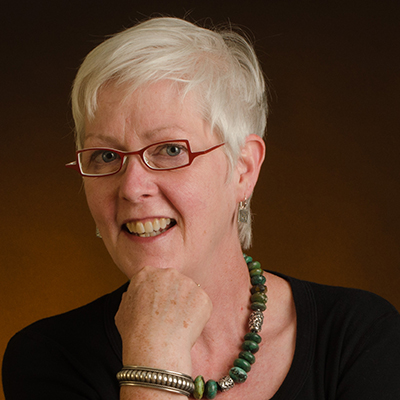
Esther Derby started her career as a programmer, and has worn many hats over the years including business owner, internal consultant and manager. From all these perspectives, one thing became clear to her: our level of individual, team and company success was deeply impacted by our work environment and organisational dynamics. As a result, Esther has spent the last 25 years helping companies design their environment, culture, and human dynamics for optimum success.
Esther has written over 100 articles, and co-authored two books: Agile Retrospectives: Making Good Teams Great and Behind Closed Doors: Secrets of Great Management. She writes about management, leadership, collaboration, organisations and change. Esther is an original founder of the Scrum Alliance and the AYE Conference, and has served two terms on the Board of Directors for the Agile Alliance. Esther holds an MA in Organisational Leadership and a certificate in Human System Dynamics.
9:00am-5:00pm | SYD WED 21.JUN.17
Lean Design Thinking: Get the right idea, then get the idea right
with Tatyana Mamut – GM & Head of Product, Amazon Web Services
In this hands on workshop, discover a helpful and practical method for generating great ideas, getting useful feedback quickly, precisely understanding the needs of your customer, and building beautiful products.
Participate in a Great Design Challenge and flex your observation and prototyping muscles; followed by exercises out in the real world on experimentation, gathering data, and iterating.
Gain the skills and tools to focus ideas, analyze, and design, through a simulated project in which participants create an actual product. This tangible learning process challenges teams to raise the bar in their product development.
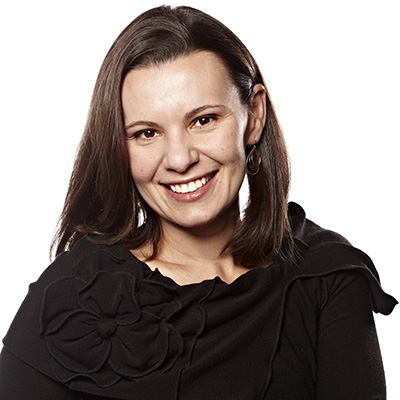
Tatyana Mamut is a leader, innovator, business builder, and economic anthropologist. She is GM and Head of Product for Amazon Web Services. Most recently, Tatyana was Vice President & Head of Product Experience for the Salesforce IoT Cloud, a revolutionary big data, real-time event processing platform. She also led Salesforce’s “Re-Invention” of the Sales CRM product, culminating in the “Lightning Experience.”Prior to Salesforce, Tatyana was at IDEO, where she built and co-led the Organisation Design Practice, which partners with large complex organisations to help them become more innovative. She led many high-stakes IDEO engagements including the creation and scaling of a User-Centered Innovation Culture at Life Technologies & the Human Centered Design (HCD) Toolkit for the Gates Foundation. She has also founded two successful consulting businesses, Emergent Thinking and CS Solutions.
Tatyana has a PhD in anthropology from UC Berkeley and a BA in economics from Amherst College. She also writes and speaks about technology and innovation, and the role of leadership and culture in creating and sustaining long-term competitive advantage in a rapidly-changing world.
9:00am-5:00pm | SYD WED 21.JUN.17 / MEL MON 26.JUN.17
Lean Enterprise: Creating high performance organisations
with Barry O’Reilly
In the pursuit of radically improved performance, smart enterprises constantly evolve their system of work – from governance and financial management to systems architecture and organisational design.
Large organisations often struggle to launch innovative products, improve processes, or create environments to help their people succeed. A number of factors conspire to obstruct moving fast at scale – including competing priorities, siloed thinking, risk averse cultures and an inability to adopt an experimentation mindset.
Explore an alternative future vision for organisations through Lean Enterprise. Discover practical principles and patterns to help you move fast at scale, and learn why and how to apply these methodologies throughout your entire organisation, instead of focusing on just one department or team.
The Lean Enterprise workshop will explain how to take a scientific approach to developing products, processes and people while running large-scale programs of work. You will learn how to create a capability that enables your organisation to transform continuously to meet internal, market and customer demands.
Who should attend?
The Lean Enterprise workshop is designed for:
- Executives interested in strategy, leadership, organisational culture and good governance
- Directors of product, technology, IT and operations
- Those working in program or project management, including members of the PMO
- Product development teams and leaders.
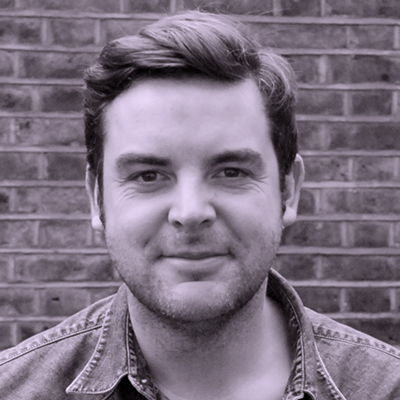
Barry O’Reilly works with leading global organisations on continuous improvement using Lean and Agile practices and principles. He has been an entrepreneur, employee and consultant. After several startups, his focus shifted towards larger enterprises where he has explored the intersection of business model innovation, product development, organisational design and culture transformation.He is a co-author of Lean Enterprise: How High Performance Organisations Innovate At Scale, the latest addition to the Eric Ries Lean Series with O’Reilly Media, 2015, and a Harvard Business Review must read for would-be CEO’s. He is an internationally sought after speaker and frequent writer for The Economist.
Barry is Founder and CEO of ExecCamp, the entrepreneurial experience for executives, and Antennae, its mission to help technology led businesses innovate at scale.
9:00am-5:00pm | SYD WED 21.JUN.17 / MEL MON 26.JUN.17
Continuous Delivery
with Jez Humble – CTO, DevOps Research and Assessment LLC
Getting software released to users is often a painful, risky, and time-consuming process. The practice of continuous delivery sets out the principles and technical practices that enable rapid, low-risk delivery of high quality, valuable new functionality to users. Through automation of the build, deployment, and testing process, and improved collaboration between developers, testers and IT operations, teams can get changes released in a matter of hours—sometimes even minutes—no matter what the size of the product or the complexity of the enterprise environment.
Jez Humble presents an in-depth guide to continuous delivery and the DevOps movement, case studies from real companies and ideas to help you adopt continuous delivery and DevOps within your organisation.
You will:
- Learn the value proposition and foundations that enable continuous delivery and be introduced to the pattern at the heart of continuous delivery: the deployment pipeline.
- Dive into the key development practices of continuous integration and comprehensive test automation. These lessons cover change management, agile infrastructure management, managing databases, architecture, and the patterns that enable low-risk releases.
- Discover the culture and organisational change patterns of high performing companies. Understand how continuous delivery and DevOps are implemented in high performing organisations.
With this knowledge, you’ll be ready to transform your organisation’s software delivery capability to get high quality solutions to market fast, while reducing the risk of the release process!
Who should attend? This workshop is for anyone involved in software delivery, from testers and developers to managers and systems administrators. It is aimed at a beginner to intermediate skill level.
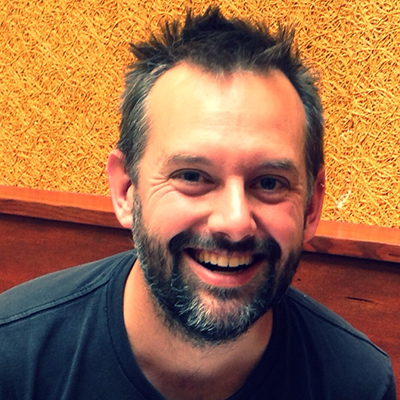
Jez Humble is co-author of the Jolt Award winning Continuous Delivery, published in Martin Fowler’s Signature Series (Addison Wesley, 2010), and Lean Enterprise, in Eric Ries’ Lean series (O’Reilly, 2015). He has spent his career tinkering with code, infrastructure, and product development in companies of varying sizes across three continents. He is currently researching how to build high performing teams, and helping to create a cloud platform for government. He works at 18F, teaches at UC Berkeley, and is co-founder of DevOps Research and Assessment LLC.
9:00am-5:00pm | SYD WED 21.JUN.17 / MEL MON 26.JUN.17
Product Management Bootcamp for Agile teams
with Melissa Perri – CEO, ProdUX Labs
This workshop will look at how Product Managers in an Agile team can manage continuous discovery and delivery. We’ll dive into the most important areas of Product Management: strategy, identifying goals and measuring success, focusing on the user, experimenting to learn, and leading teams around a goal.
Product Management is the art of balancing the business and customer’s needs. While many Agile teams are excellent at maintaining a consistent pace of delivery, they struggle with meeting user’s needs and determining if their products are successful. Most Product Owner courses only teach the delivery part of the process: creating and grooming the backlog, planning sprints, and prioritising stories. They rarely look at ensuring that teams are building the right features. Without this piece, we’re creating a lot of risk for our businesses.
You will learn:
- What is good product management? Product owner vs product manager, product strategy, great product management essentials
- Identifying common goals and measuring success: Common problems with user stories, introduction to the ‘Jobs to be done’ framework, how to write ‘job stories’ to put you in she shoes of the customer
- Understanding users: How to build empathy for your users in teams, indentifying user problems
- Experimenting to learn vs Experimenting to deliver value: Finding problem-solution fit and product-market fit, minimum viable products vs minimum feature sets, experimenting to learn more about your customers and the right solutions, mitigating risk through experimentation frameworks
- Leading product teams to success: The product manager as the facilitator of teams, how to structure teams for success, dealing with constraints, creating effective product roadmaps
Discover how to:
- Limit the risk for your companies by ensuring they are building the right features early.
- Kill bad feature ideas early and often.
- Balance user and business needs in effective Product Management.
- Build empathy for your users with lightweight and effective research.
- How to identify user problems that will produce business value.
- How to create a dynamic Product Strategy that will further the business and align teams.
- How to do lightweight experimentation to learn more about your users and effective solutions.
- How to rally a team and stakeholders around creating great products for your users.
- How Agile teams can structure their processes to do continuous discovery and delivery.
Who should attend? This course will be great for Product Owners and Product Directors, as well as other members of Agile teams who would like to learn more about the role.
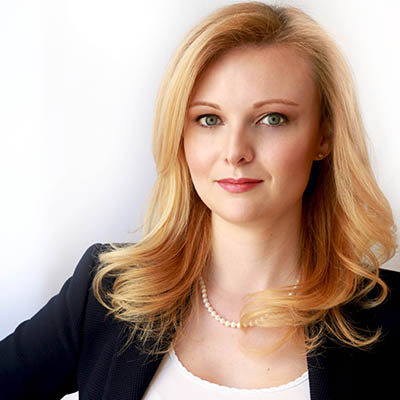
About Melissa Perri – CEO, Produx Labs
Melissa Perri is a Product Manager, UX Designer, speaker, and coach. Working with product development teams around the world, Melissa helps them create strategies that satisfy users and drive business goals. She coaches Product Managers to answer two important questions – “Should we build this?” and “Why?” Her clients include Capital One, Spotify, Rovio, Valtech, Plated, Wayra UK, and Levo League.
After successfully integrating concepts from Lean Startup, Agile, and Continuous Improvement into her own role as a Product Manager, Melissa began teaching classes and workshops. She wrote and taught the Product Management curriculum for General Assembly worldwide. A frequent speaker, Melissa has had the pleasure of addressing audiences at conferences such as QCon, Mind the Product, Lean UX NYC, Lean Agile Scotland, and Agile 2015. Before becoming a consultant, she worked as a Product Manager and UX Designer at Barclays Capital, OpenSky, Capital IQ, and Conductor. Melissa has a degree in Operations Research and Information Engineering from Cornell University.
She has just completed a book, Managing Products, (published by O’Reilly). She is also launching an online Product Management school for individuals and enterprise teams called Product Institute.
9:00am-5:00pm | SYD WED 21.JUN.17
Experiencing SAFe
with Mark Richards – Partner, Context Matters Pty Ltd
The Scaled Agile Framework (SAFe) is now six years old, and with each successive version the famous “Big Picture” has become a little more complex and daunting. Whilst the evolution has primarily been driven by the scale and complexity of the challenges people are applying it to, the heart of SAFe remains the Agile Release Train. The ART is a long-lived, self-organising “team of agile teams” aligned to a common mission, and the journey organisations take to implementation is one of identifying, launching, and evolving strategic ARTs.
Using the internationally acclaimed SAFe City simulation, we will take an experiential approach to exploring the identification, design, launch and first three months in the life of an ART. In the words of a recent course participant, “seeing SAFe as working practice really underlines it as a useful tool-set rather than a lot of theoretical diagrams“.
Through simulation and stories from the trenches, workshop participants will learn:
- What kind of problems the Agile Release Train is designed to tackle
- The essential thinking involved in effective ART design and launch preparation
- Economic Prioritization using Cost of Delay and Weighted Shortest Job First (WSJF)
- How the famous “all-hands” 2-day PI planning event works
- The keys to “Responding to change over following a plan” during execution
- An approach to facilitating an Inspect and Adapt cycle in support of system-level optimization for a team of teams
Discover how to:
- Limit the risk for your companies by ensuring they are building the right features early.
- Kill bad feature ideas early and often.
- Balance user and business needs in effective Product Management.
- Build empathy for your users with lightweight and effective research.
- How to identify user problems that will produce business value.
- How to create a dynamic Product Strategy that will further the business and align teams.
- How to do lightweight experimentation to learn more about your users and effective solutions.
- How to rally a team and stakeholders around creating great products for your users.
- How Agile teams can structure their processes to do continuous discovery and delivery.
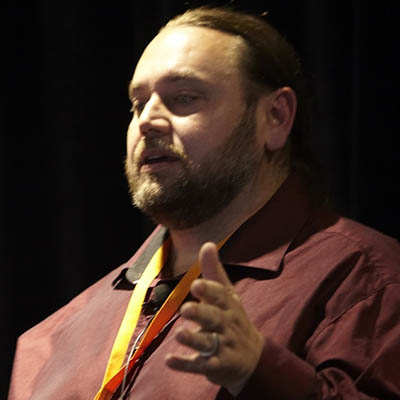
Mark’s contribution to Scaling Agile in complex organizations is almost unparalleled. He has worked with numerous Enterprise customers across most industries both here in Australia and across the globe. Mark’s expertise and results are anchored in the Scaled Agile Framework (SAFe), but are strengthened by his passion, depth of knowledge and his unique outcomes focused facilitation style.Since attending the inaugural SAFe Program Consultant (SPC) course in 2012, Mark has gone on to became the first person worldwide to achieve the highest level of SAFe certification (SPCT) in 2014. He continues to develop value-adding techniques and advancements and was recently recognized as a SAFe Contributor for his work with program-level metrics.
Whilst Mark is known for his ability to move seamlessly from a deeply technical discussion about DevOps pipelines and tooling to another about strategic initiatives and portfolio governance, at heart he is the Coaches’ Coach. He knows the true essence of great facilitation and is happiest as he helps clients develop their problem solving and continuous improvement skills to leave lasting and sustainable change.
A frequent presenter at conferences and meetups both locally and internationally, Mark is also the author of the blog “The Art of SAFe” and working on a book of the same name.
9:00am-5:00pm | SYD WED 21.JUN.17
Are you up for the Bento Box Challenge?
The Bento Box Challenge is not for the faint hearted.
Right from the outset, you are immersed in a web of ambiguity where you are forced to unravel the layers and work with your team to build, learn and iterate. New challenges shortly emerge where your team is faced with scaling your ways of working whilst incorporating real-time customer feedback to ensure the product’s signature quality traits are met. Four challenges are set across the day where you and your teams will experience a roller coaster journey to overcome, harmonise, evolve and transcend.
This next-level agile workshop has been designed so that participants naturally evolve beyond their comfort zones and stretch their understanding of working in scaled teams within an Agile context.
By being part of the Bento Box Challenge, you will learn:
- how to handle ambiguity and convert this into a tool for creativity
- scaled product development by applying a MVF (Minimal Viable Framework)
- to think beyond the basic practices of Scrum and Kanban and gain a deeper understanding of agile and live the manifesto values
- two new techniques from the list: experimentation, facilitation, agile leadership, coaching, visualisation
- how to work in a collaborative, changing environment
If you are an Agilist with 12 months+ experience and want to challenge yourself and expand your perceived limits in a safe and learning environment, be brave and register for this unique opportunity.
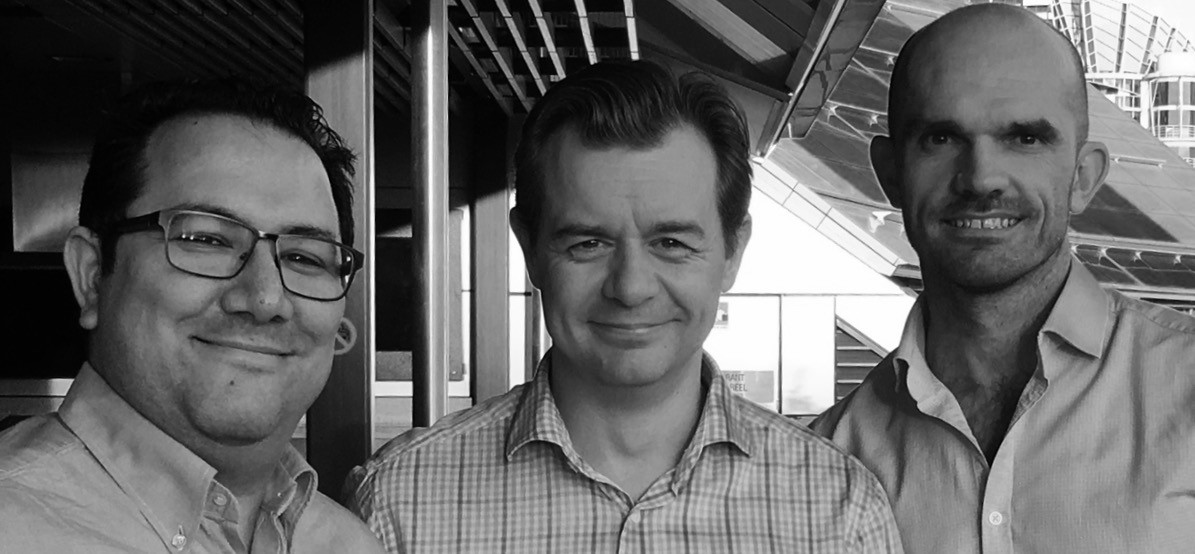
About the Workshop Leaders
Dave Bales – Agile Coach, Commonwealth Bank
Dave Bales is one of three Certified Enterprise Coaches (CEC) in Australia, a Chartered IT Professional with 25 years’ experience leading teams through some difficult projects, gnarly change initiatives, and complex Agile adoptions. He has worked with CBA over the past five years to help establish their Agile capability and transition to Agile practices and principles. In his spare time Dave also provides CSM & CSPO coaching courses, hosts and contributes to several Agile conferences and tutors 2nd year undergrads with their Agile projects.
Alidad Hamidi – Agile Coach, Commonwealth Bank
Alidad Hamidi works with leading Australian enterprises as an Agile Coach to enable agility through self-organisation, system thinking and human interaction. He has helped organisations like Medibank, Telstra, Suncorp and Commonwealth Bank in their Agile journey and is currently working with a major regulatory program with implementation of large scale Agile. Alidad believes while there is value in continuous improvement, he prefer to focus on continuous learning, trust, collaboration, co-creation, reflection and continuous empathy and courage. Alidad has presented and facilitated workshops in various agile events and meetups.
Shane Murarenko – Agile Coach, Commonwealth Bank
Shane Murarenko is a Senior Agile Coach who has been involved in the Agile community since 2008. Shane started his Agile journey driving Telstra Wholesale’s first Agile initiative which ended up receiving a number of accolades. Shane helped drive Agile transformational change across a number of organisations including Medibank and NBN. More recently, Shane has spent the last two years at CBA, where he provides coaching and leadership within Digital to support 12 teams in building and sustaining Australia’s #1 banking app, Commbank. Shane has presented at various Agile events and gets a kick out of helping individuals and teams achieve their outcomes.
